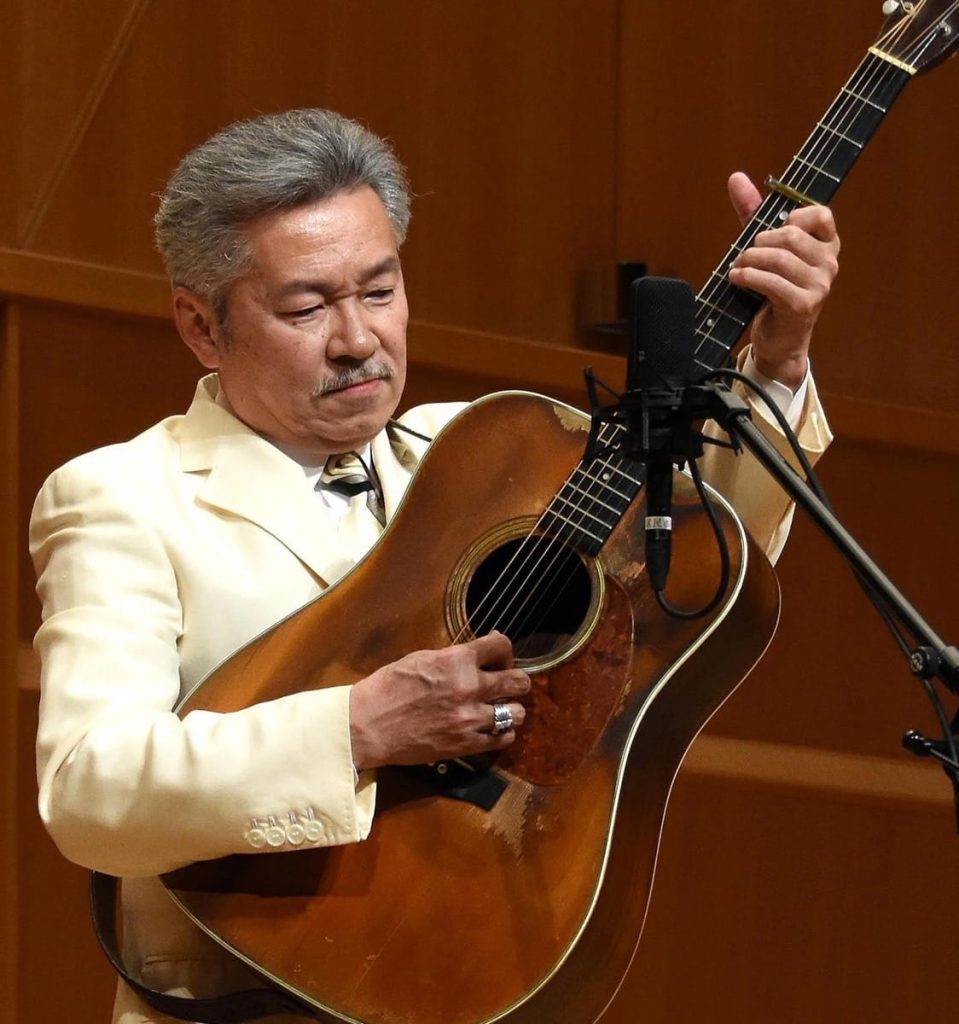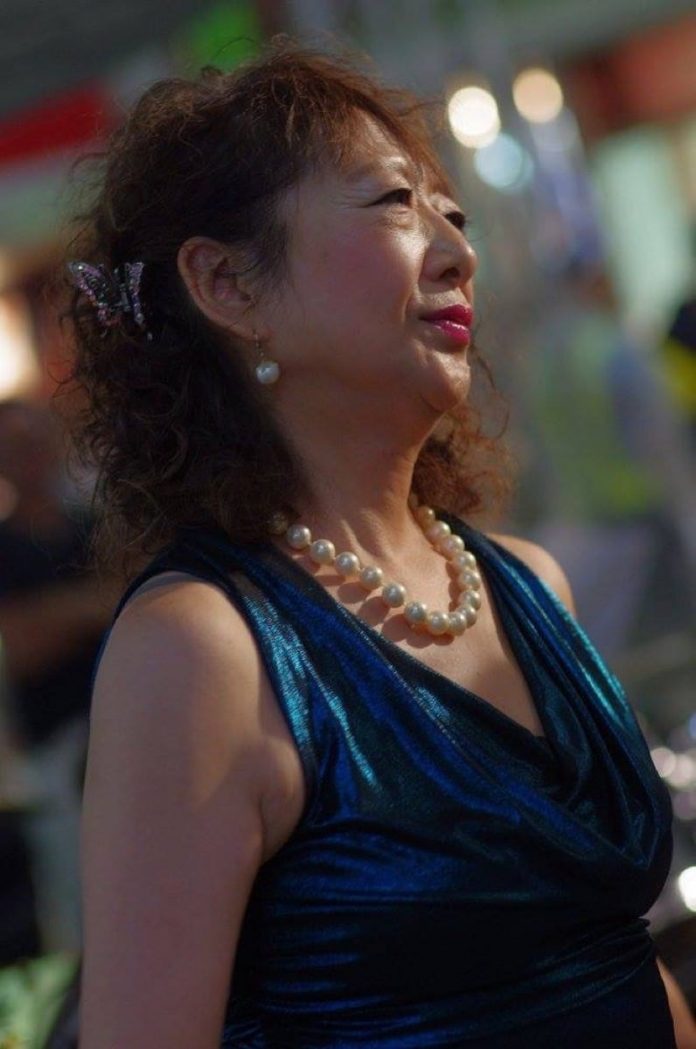Many of the best Japanese jazz singers, like Kansai’s Masayo Arai, are known only regionally. That goes for a few “good ones” recommended by guitarist and Japan-regular Joshua Breakstone, including Chika Toyota, Yuki Hidaka, Shinco Comatani and Aiko Ito. The guitarist says the latter “has the real feel – she lived in New York for years – speaks great English and swings.”
Some have have gained national fame. I often used to be asked if I knew who Chie Ayado was, the compact singer-pianist matching the image most Japanese have of jazz singers. They all knew her because she had an interesting life story, appeared on TV and was marketed as a “personality”, though for me her connection with jazz appeared tenuous. Another, Kimiko Kasai, recorded an album in 1972 with Gil Evans and a large ensemble consisting of mostly Japanese musicians. In the early 90s, I remember a singer from Tokyo named Shun Sakai who performed with some creativity, going beyond the stale approach represented by “The Twelve” (see part one).
I wait with baited breath to hear if she (usually a she) sings the line as written, or, likely as not, ‘But don’t change YOUR hair for me.’
But for all the singers, professionals included, when doing one of “The Twelve,” getting the words right counts. Take Rodgers & Hart’s familiar My Funny Valentine. Hart builds a portrait of a love interest who does not fit the Greek ideal of physical perfection, then indicates that he wants this imperfect lover to remain as is. The lyrics include this series of rhetorical questions:
“Is your figure less than Greek?
Is your mouth a little weak?
When you open it to speak
Are you smart?”
Then comes the key line of the song: “But don’t change a hair for me.”
Now I mount my high horse, for whenever I listen to someone – particularly in Japan – performing this, I wait with baited breath to hear if she (usually a she) sings the line as written, or, likely as not, “But don’t change YOUR hair for me.”
This makes a total mash of Hart’s carefully conceived lyrics as their meaning hinges on just one word, the article “a” that prefaces “hair”, now unaccountably shampooed into “your hair”. Considering that “but” refers to everything that has preceded it, “your hair” makes zero sense as there has been no mention of hair anywhere at all up to this point, nor does Hart allow for hair anywhere in the song. “Don’t change a hair”, of course, makes use of an English idiomatic expression meaning don’t change even one tiny thing.
Tempering my ire, I allow that for Japanese singers working with a foreign language, such a minor distinction as this must be pretty difficult to grasp and to internalise. I understand that, and I applaud them for their efforts in attempting what is no easy task. That said, words are important and if a singer substitutes “your hair” for “a hair,” it’s clear she has not understood the song she is presenting. Why, then, should I be convinced by her performance? She may look the part and have a perfectly lovely voice, but still, something is missing. I want to tell these singers “Please, don’t change a hair of Lorenz Hart’s marvellous words.”(1)
One of the most remarkable Japanese singers of American songs I’ve encountered here doesn’t even do jazz. Rather, Kazuhiro Inaba, from Nishinomiya, near Osaka, sings bluegrass and country music. Plays it, too, skillfully, on a variety of instruments: banjo, guitar, mandolin and a bit of fiddle. He most often plays guitar these days, though banjo was his first axe, and he does various styles on it, finger picking and claw hammer included. His soft mellifluous tenor has a genuine country feel, sans vibrato, filling a room with a golden glow. He even yodels, though not often. On solo performances, I’ve seen him hold an audience rapt for three full sets with just his guitar and voice. His homey stage presentation entertains and educates.

Kaz knows countless songs. Make a request at the break, and he’ll thumb through an enormous looseleaf folder of lyric and chord sheets until he finds it. He covers everything from spirituals and Stephen Foster to gospel and Bob Dylan, and beyond. When my mother, brother and sister visited Japan a few years ago, I took them to hear this country maven, and he had no trouble playing all their requests, mostly Johnny Cash songs. Toward the end of the evening, my mother turned to me and asked, innocently, “Do you think he can play Country Roads?” I assured her he could.
Inaba has performed in Nashville and other places in the US and has many friends and connections in the world of bluegrass music. Once, a couple of his buddies came to Japan for a series of performances Kaz arranged. The friends were Keith Little, guitar and vocal, and former Virginia Boy, Blaine Sprouse on fiddle.(2) After the show I attended, my friends and I were invited to the private dinner where Kaz and company entertained the visitors. Sprouse, well soused, was voluble and happy. Clear-eyed Californian Little, not a drinker, at one lull in the conversation said purposefully “Kazuhiro Inaba can play with any bluegrass ensemble, anywhere, in the United States.”
Sure, there is a discernable accent, and certain sounds are almost impossible for a non-native speaker to make. Overall, Inaba’s English is clear and understandable, and he’s a pretty fluent speaker, meaning he understands the lyrics he’s singing. Clearly, he has done his homework and studied.
Every time Kazuhiro Inaba sings, he offers living, breathing proof that a Japanese can learn the necessary skills to make a satisfactory performance in the field of American vocal music, jazz or otherwise. Kitamura-san, the clarinet master, might not be a fan of country music, but I bet he’d approve of the effort. He’d enjoy the quiet passages, too.
Footnotes
(1) Alone among singers, Sarah Vaughan gets a pass for occasionally flubbing a lyric – divinity has its perks.
(2) The Virginia Boys provided backup for the legendary bluegrass duo, Jim and Jesse.
See part one of this article
















